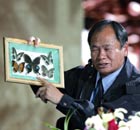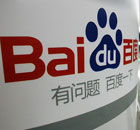Economy
China voices cautious optimism on exports recovery
(Xinhua)
Updated: 2010-03-06 19:58
 |
Large Medium Small |
BEIJING - Commerce Minister Chen Deming said Saturday China's exports may need two or three years to return to the pre-crisis level, and called for the United States to loosen high-tech exports to China to bridge the trade gap.
"Although China's exports have regained momentum since the beginning of this year, it would take two or three years for exports to return to the level of 2008, as global recovery is still haunted by uncertainties," Chen told a press conference.
He was speaking on the sidelines of the annual session of the National People's Congress (NPC), the country's top legislature.
"Now it is still too early to say exports will score full-year growth this year," he said.
The worst global recession in eight decades dealt a heavy blow on China's exports which fell 16 percent to 1.2 trillion dollars in 2009, while imports dropped 11.2 percent to 1 trillion dollars.
"We should have basic understanding about the reality that the global recovery is still very fragile and unstable," Chen said.
US HIGH-TECH BAN
When asked for comments about some US officials labeling China as a "currency manipulator", Chen said he had not got official information on the issue, but he noted exchange rate did have relations with trade, unless the bilateral trade was completely "open".
However, that was not the case between China and the United States considering the US restrictions on high-tech exports to China, Chen said.
"What is the point of talking about surplus and deficit if bilateral trade is not on the basis of openness and equality?" he asked.
"As a matter of fact, many Chinese importers told me they wanted to buy from America, but were baffled by the US export restrictions," he said.
The US export to China ranges from jumbo jet to farm produce. However, high-tech exports are banned. The US government intensified restrictive measures in 2007, according to Chen.
Chen said the US restrictive measures were not fair for the US exporters, producers and consumers, notably against the background that President Obama pledged to double US exports in five years to sort out unemployment. STABLE YUAN
China, which replaced Germany as the world's biggest exporter at the end of 2009, is under increasing criticism of devaluating the renminbi to earn artificial price advantages.
Premier Wen Jiabao said on Friday that China would keep the exchange rate of the yuan basically stable at an "appropriate and balanced level"in 2010.
Chen said exchange rate was part of a nation's domestic macro-policy, and the issue should not be politicized.
Su Ning, deputy governor of China's central bank, said on Saturday stronger yuan could not address the Sino-US trade imbalance.
Although more than 70 percent of China's trade surplus came from United States, Chen said that was not what China desired.
While China's trade surplus with the United States and European Union remained hefty, China held a deficit of more than 120 billion US dollars with other countries, and the surplus took only 11 percent of its total foreign trade.
Chinese officials have repeated the stance that the nation does not seek to accumulate hefty trade surplus.
Chen said China's import incentives have already paid off, as surplus dropped by one third to 190 billion US dollars last year.
In the first two months of this year, the surplus witnessed another 50 percent drop from the same period a year ago.
In response to a question about China's subsidy on domestic producers to help them earn unfair price advantages, Chen said China's stimulus incentives benefited the world recovery and policy coordinating.
"China's stimulus incentives on domestic consumption and exports abide by the rules of the World Trade Organization and bear no protectionism," Chen told reporters.
China's stimulus package not only spurred up domestic demand, but also benefited world economic recovery and global policy coordinating.
Chen noted the pro-consumption measures implemented last year, including subsidies to the auto and home appliance buyers, also invited the participation of foreign businesses.
"A couple of days ago, more than 20 business leaders of the Fortune 500 companies told me their business in China outshined their performance in other countries last year," he said.












